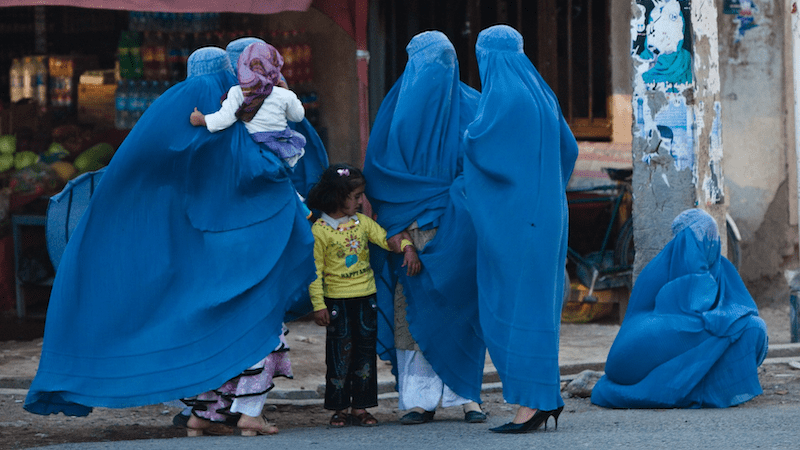
The situation in Afghanistan since the Taliban’s takeover in August 2021 has garnered global attention and condemnation. In the wake of their return to power, the Taliban has systematically targeted Afghan women and girls, imposing oppressive restrictions that infringe upon their fundamental rights and freedoms.
Rights groups, including Amnesty International and the International Commission of Jurists (ICJ), have raised their voices against these severe measures, branding them as gender-based persecution and crimes against humanity under international law. This essay delves deeper into the ramifications of the Taliban’s actions on Afghan women and girls, the impact on the international community, and the urgent need for justice and accountability.
In the immediate aftermath of their takeover, the Taliban’s rule unfolded with a series of harsh edicts targeting women and girls. Their initial promises of a more moderate governance quickly faded, and they began enforcing a regressive interpretation of Islamic law that severely restricted women’s autonomy. Women were barred from participating in public life, denied access to education beyond the sixth grade, and excluded from most job opportunities. These restrictions harkened back to the Taliban’s previous rule in the late 1990s when Afghan women endured similar oppression.
The Persecution of Afghan Women
The restrictions imposed on Afghan women and girls by the Taliban constitute a systematic campaign of gender persecution. The joint report by Amnesty International and ICJ meticulously documents cases of imprisonment, enforced disappearances, and torture inflicted on women who dared to oppose or peacefully protest the Taliban’s oppressive policies.
Many female activists, journalists, and human rights defenders have faced grave dangers, with some even losing their lives in the pursuit of justice and equality. Amnesty International’s Secretary-General, Agnes Callamard, rightfully characterizes the situation as “a war against women.” The suffering of Afghan women has become a critical test for the international community’s commitment to human rights and gender equality.
The Taliban’s actions are not isolated incidents but are organized, widespread, and systematic, constituting crimes against humanity. Urgent and decisive action is needed to dismantle this system of gender oppression and persecution that threatens the lives and aspirations of millions of Afghan women and girls.
The ICC and Accountability
The International Criminal Court (ICC) plays a vital role in addressing crimes against humanity, including gender persecution. The report by Amnesty International and ICJ calls upon the ICC to include gender-based persecution as a crime against humanity in its ongoing investigation into the situation in Afghanistan. It further urges the ICC to take legal action against those responsible for the systematic persecution of Afghan women and hold them accountable under international law.
However, the path to accountability is not without challenges. The Taliban’s administration is yet to be officially recognized by the United Nations and the international community, complicating efforts to bring them to justice. Nevertheless, the international community must remain resolute in its pursuit of justice for the victims and strive to ensure that the perpetrators of gender persecution do not evade accountability.
The global outcry against the Taliban’s actions underscores the collective responsibility of the international community to protect human rights and uphold gender equality. Nations worldwide must stand in solidarity with Afghan women and girls, offering them refuge and support in the face of grave danger. This solidarity can be demonstrated through the provision of humanitarian aid, asylum for those at risk, and facilitating safe evacuations for vulnerable women and their families.
Universal jurisdiction serves as a powerful tool in holding perpetrators of international crimes accountable, even when the crimes were committed outside the jurisdiction of any particular country. States are encouraged to exercise universal jurisdiction to prosecute individuals responsible for gender persecution in Afghanistan and other egregious human rights violations. This approach ensures that justice is not constrained by geographical boundaries and that the perpetrators do not find safe havens to evade accountability.
Another critical aspect of supporting Afghan women is to invest in educational initiatives and civil society engagement. Promoting education for girls and women is crucial in dismantling the Taliban’s oppressive system and empowering women to reclaim their rights and identities.
The international community can support initiatives that provide educational opportunities and vocational training for Afghan women, allowing them to become agents of change within their society. Civil society organizations play a vital role in advocating for gender equality, human rights, and accountability. Governments, international organizations, and concerned citizens must lend their support to these organizations and initiatives working on the ground in Afghanistan. They can provide financial aid, resources, and platforms for amplifying the voices of Afghan women, ensuring their struggles are heard and acted upon.
Conclusion
The plight of Afghan women and girls under the Taliban’s oppressive regime is a stark reminder of the urgent need to protect and promote human rights worldwide. The gender persecution and crimes against humanity in Afghanistan demand a resolute response from the international community. It is essential to hold the perpetrators accountable and provide unwavering support to the victims of this systemic oppression.
By standing in solidarity with Afghan women, supporting educational initiatives, and engaging civil society, the international community can pave the way for a more just and equal future, not only for Afghanistan but for women everywhere. The time to act is now – to dismantle the system of gender oppression and persecution and to ensure that the voices of Afghan women are heard and their rights upheld. Only through concerted efforts can we hope to safeguard the dignity, freedom, and aspirations of women and girls in Afghanistan and beyond.
This post was originally published on this site be sure to check out more of their content.








